Bringing kids into the kitchen provides opportunities for them to learn life skills and character traits that will serve them for many years to come. Here are 10 steps to teach kids to make their own meals.
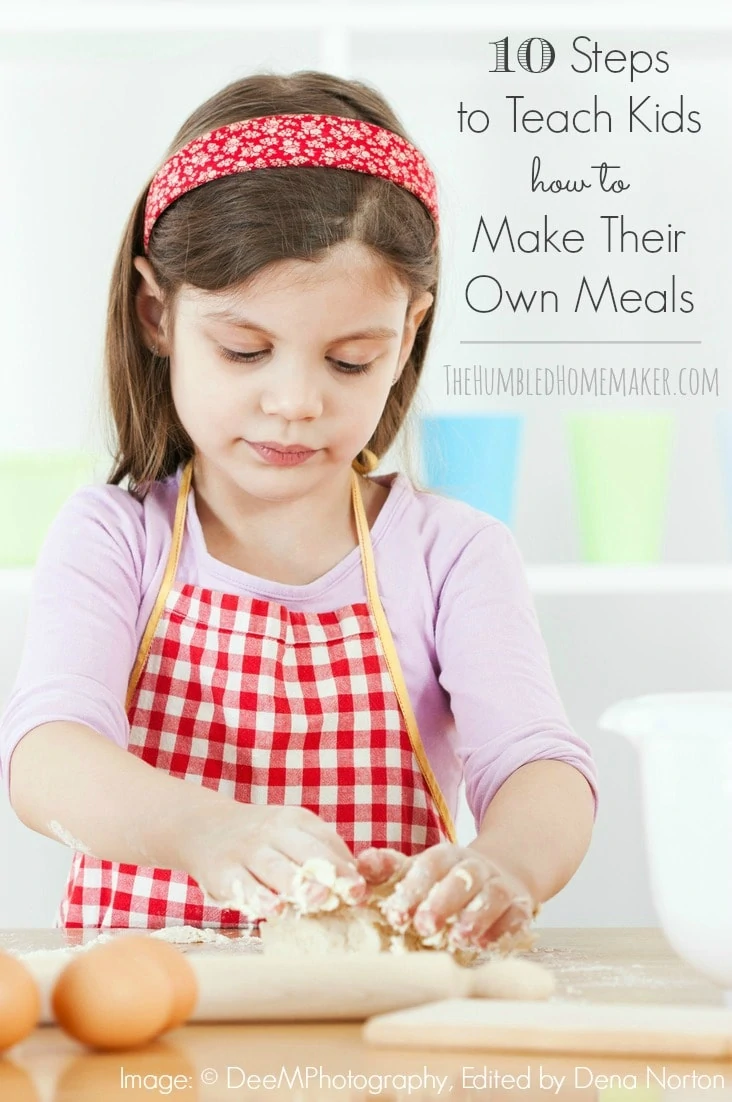
If you want to teach your kids to cook, I highly recommend checking out Kids Cook Real Food (the curriculum map in particular will help you know if this class is a good fit for your family)!
By Dena Norton, Contributing Writer
We’re big on self-sufficiency in the Norton household.
I’ve learned that I can teach kids to make their own meals!
While they are just 6 and 3 years old, I often ask my kids to make their own breakfasts, lunches, and snacks, and sometimes help with dinner prep too!
Bringing kids into the kitchen provides opportunities for them to learn life skills and character traits that will serve them for many years to come, and it also means Mom has help getting three meals on the table each day! Yes and amen.
If you need more convincing, check out these 12 reasons every child should learn to cook.
Sounds great, you might be saying, but how do I teach kids to make their own meals?
10 Steps to Teach Kids to Make Their Own Meals
1. Set realistic expectations.
First of all, if you want to teach kids to make their own meals, it requires a lot of front-end investment with mostly longer term rewards.
In the beginning, short attention spans, inefficient methods, and frequent spills will dominate. Therefore, preparing for this will make for a much more pleasant experience for everyone.
2. Start early.
Even babies can learn the kitchen is a happy place to be, so give them a safe area to play with wooden spoons and plastic bowls while you cook.
Toddlers and preschoolers can be given simple “helper” tasks, and school age children can begin actually preparing foods with supervision. This post has great, age-appropriate lists of kitchen tasks for children.

3. Make cooking fun!
We all know kids are more likely to enjoy something they see us enjoying. So, here are a few ideas for having fun in the kitchen:
- Play music, and talk about the day while you cook.
- Try new recipes.
- Get creative with food presentation.
- Buy decorative plates and utensils for them.
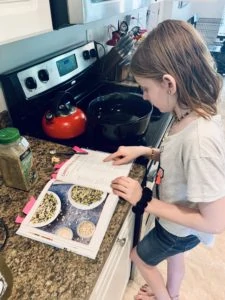 4. Identify appropriate food choices.
4. Identify appropriate food choices.
Afraid your kids will pile their lunch plate high with chips and eat nothing else? I hear you. You can either not buy chips, or try one of one of these:
- First of all, Review that day’s food options before they make their plate.
- Also, for younger children, post a “menu” with pictures of foods they can choose for their snack/meal.
- Furthermore, for older children, post a list of meals/snacks, or create a binder with simple recipes they can prepare. Check out this list of 20 more recipes kids can make!
5. Set the stage.
Minimal advance prep like chopping raw vegetables or slicing cheese makes things so much easier for younger children. Making minor adjustments in kitchen organization to bring basic supplies and ingredients within reach can also be a great help.
For example, I’ve designated a lower cabinet for these items the kids commonly use:
- Paper plates and bowls,
- Plastic utensils,
- Drinking cups,
- Oats and homemade granola,
- Homemade Larabars, and
- Nuts, dried fruits, and other snack foods
6. Use the “I Do, We Do, You Do” method.
This model is a good one for teaching kids just about anything, including how to make their own meals. With each new skill, demonstrate and explain it to the child first, then allow him/her to help you. Finally, supervise as he/she tries it on his/her own.
7. Expect more.
Our general approach to parenting is to give our kids a little more than they think they can handle, then cheer them on from the sidelines while they come up with their own solutions and enjoy their own successes.
It’s amazing how quickly they learn when they’re hungry and expected to make their own food! Their methods may be different than ours, but they get it done, and are very proud of themselves when they do.
8. Recognize their efforts.
Kids love to be acknowledged for their work. I try to make multiple comments to the child, and to the rest of the family, about what a great job he/she did preparing his/her own lunch or helping make part of the dinner. As a result, they beam with pleasure every time.
9. Acknowledge and reward character traits.
When children demonstrate a good work ethic, creativity, service to others, and other desirable traits, be sure they know you’re even prouder of that than their ability to help with the meal. Most of the rewards in our home are not for good behavior or finishing tasks, but for demonstrations of love, kindness, and service to others. Especially relevant, we want the children to know those things are what we value most.
10. Back away.
Remember that, most of all, the ultimate goal is self-sufficiency. As my daughter has mastered the fundamentals of cooking (safety, not licking fingers, measuring ingredients, etc.), I’ve aimed to give her more space to get creative and make her own decisions (and mistakes) when preparing food. Yet, on days when I’m tempted to shoo her away and do it more quickly myself, I visualize a day ten years from now when I have my feet propped up on the couch while she makes dinner for the rest of us!
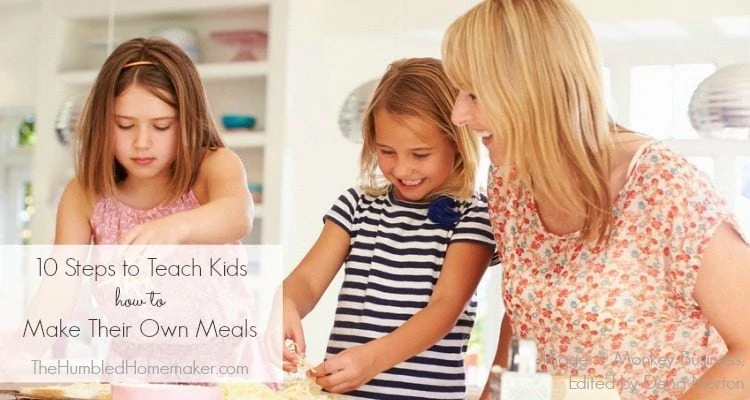
Bringing our kids into the kitchen is critical for helping them develop a good understanding of healthy wholesome food and how to prepare it. But it’s also a training ground for other areas of life – autonomy is gained, creativity is expressed, and serving others becomes second nature.
And don’t we all know the world needs more autonomous, skilled, and servant-minded adults?

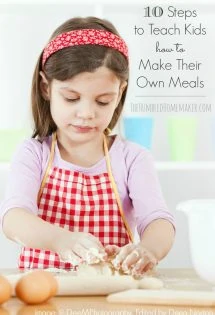
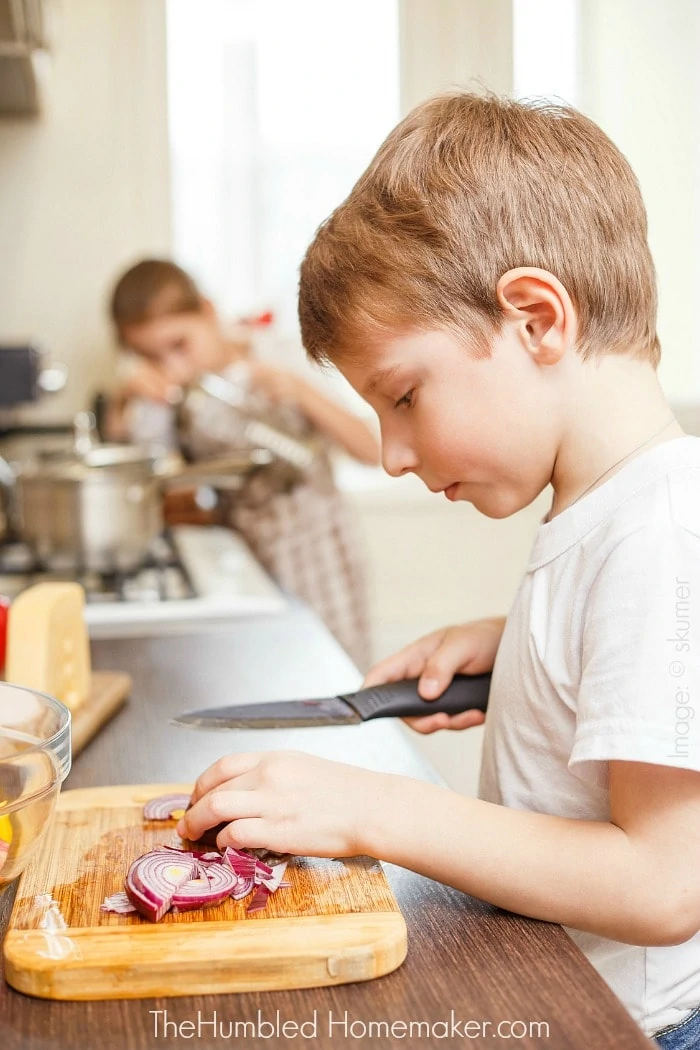

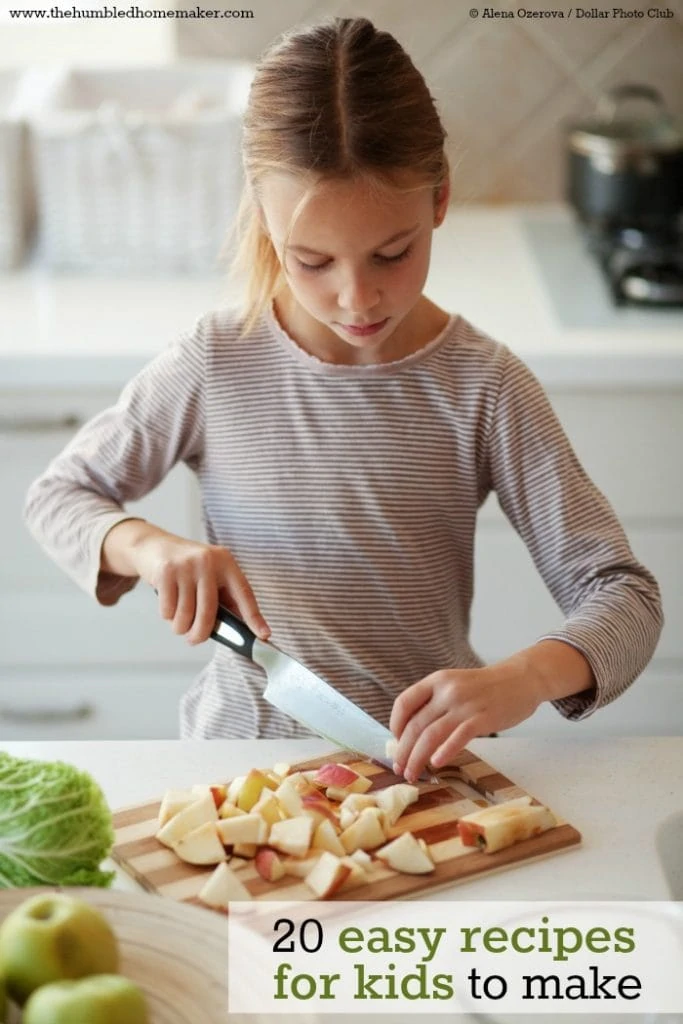




Stefanie
When my oldest was little, I often had her help me with fun-tactile stuff like mixing granola ingredients or mashing pumpkin. As she got a little older, I fell out of this habit, maybe I was too tired from my second and third pregnancy. We have begun to look into Montessori teaching methods and I have started to have my children (ages 4.5 and 2.5) help out in the kitchen more, and have started teaching my oldest how to use a knife.
I agree, it takes more up-front time and energy investment, but my 4 year old is able to make scrambled eggs from start-to-finish on her own, and my 2 year old is able to it with assistance. As mentioned, we have the plates, utensils and pre-cut veggies in drawers, shelves and cabinets they can reach. Thanks for this article, I found the link to momables really helpful
Dena Norton
That’s awesome, Stefanie! It’s always helpful to hear how other moms do it! You definitely deserve a trophy for having a 4 year old that can scramble eggs! 😀
Busynothingsmom
My children love helping me in the kitchen! They are 5, 4 and 18 months. Yes, it may take twice as long to prepare dinner, but keeping the end goal in mind helps. Good post!
Dena Norton
Thanks, Busynothingsmom! Sounds like you’ll have a big payoff for all that front end investment in a few years! 😉
Jamie @ Milk Allergy Mom
This is fantastic for food allergy families. Our kids have to eat food at home! Sharing with our readers, thank you!
Dena Norton
Thank you, Jamie! We’ve had my son on the GAPS diet since January and I definitely now have a better appreciation for the amount of work it takes for families with special dietary needs to prepare everything at home. I hope this post is a help to your readers!
Lisa @ This Pilgrim Life
This is great. We love to be in the kitchen together and I try to let my kids help as much as possible. We enjoy listening to audiobooks while we work in the kitchen too. My oldest two children are (newly) 6 and 4. They can do a lot to help, but I have not yet encouraged them to prepare their meals on their own. You’ve inspired me to think of a few things they can do and give them that freedom.
Dena Norton
Ooh, I love the idea of audiobooks, Lisa – thanks for that tip! Glad you enjoyed the post!
Rebekah
What a great idea! I love the concept of raising adults, not big children and this is consistent with that line of thinking. The point about making the kitchen an enjoyable place…yeah, I could use that for myself #wishilikedcookingmore! 🙂 Thanks for the awesome tips!
Dena Norton
You’re so right, Rebekah. Keeping the long view when we’re training them is so key, especially in the areas that aren’t our favorites…I’ll teach yours to cook if you’ll teach mine to do laundry! 😉